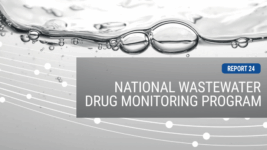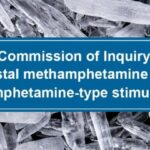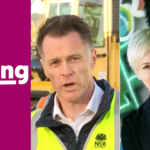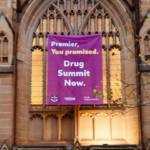Spike in Prohibited Drug Use and Associated Crime Intensifies Calls for Legalisation

The Australian Crime Intelligence Commission has yet again consulted the nation’s sewage to find that its people had consumed more than 22.2 tonnes of crystal meth, cocaine, heroin and MDMA over the 12 months to August 2024, which is the highest level ever seen since the program commenced in 2016, and these substances are supplied by serious and organised crime groups.
The 24th report of the National Wastewater Drug Monitoring Program further advises that this is the first time that three drugs – coke, ecstasy and heroin – have come in simultaneously at record levels, and it considers that consumption of methamphetamine, MDMA and cocaine will continue to rise in a similar manner until 2027, while heroin use in this country has plateaued.
This surge in illicit substances being sold on the black market has too been, of late, accompanied by rising Sydney gangland killings, of which NSW police minister Yasmin Catley has explained are all about “drugs and control”, and it’s involved at least 16 suspected gang-related shootings since Taskforce Falcon was launched, via the combining of 13 preexisting strike forces, in May 2025.
Australian Strategic Policy Institute national security program director Dr John Coyne has suggested in response to the findings that “global drug production, both synthetic and plant-based, has expanded to a point where supply reduction has become an uphill battle, if not impossible”, while “demand reduction has fared no better”, so he’s calling for the prioritisation of harm reduction.
ASPI is not the usual source of progressive drug law reform information, yet Coyne is clear that “safe supply initiatives” and “supervised consumption services” are what’s needed, rather than continuing with the “fantasy that arresting more people or seizing more drugs will solve the problem”. But harm reduction won’t prevent the associated crime, violence or killings and for this legalisation is key.
Rising global availability
The wastewater report further outlines cannabis continues to be “the most consumed drug by a large margin”, while the surge in methamphetamine and cocaine use has been fuelled by a global rise in production of these drugs. There is also a similar rise in MDMA production. And this supply side push has resulted in increased local demand for illicit substances.
“High end domestic manufacture of illicit drugs is becoming more sophisticated,” the report continues, outlining that different sorts of precursor chemicals are being used to produce different quantities of the same drug, and the substances are then being smuggled into Australia in a variety of different ways and forms.
Over the 12 months to 2024, Australian federal authorities seized 33.7 tonnes of illegal drugs being smuggled into the country, which is an amount 51 percent higher than the total amount that was locally consumed over that period.
“Australia is not alone in dealing with threats of this type,” the ACIC report made clear. “It is manifesting in the United States, Canada, the United Kingdom, New Zealand and across Asia and Africa.”
The ACIC further found that “demand for the major drugs is resilient and difficult to address”, and supply will continue to meet these needs.
Harm reduction saves lives
Australia adopted its first National Drug Strategy in 1985, which garnered a reputation as a leader in harm reduction. This only increased with the nationwide roll out of needle and syringe programs at the behest of drug law reformist Dr Alex Wodak beginning in 1986, while the Carr government’s 1999 NSW Drug Summit saw a safe injecting centre established on Gadigal land in Sydney’s Kings Cross.
This century, however, has seen conservative state governments reverse course, so that zero tolerance drug driving laws were adopted nationwide, whilst calls over this entire period for the roll out of pill testing or drug checking services to avoid overdoses deaths and drug harms, due to the rise in the use of party drugs such as ecstasy, were resisted until quite recently.
But while politicians of both sides of the divide have continued to enact criminal sanctions against illicit drugs in general, Australian public opinion has shifted dramatically and has come to an understanding that illegal drugs, just like alcohol, can cause great harms, as well as pleasure, and having guardrails around the use of these drugs might be better than overdose or criminal charges.
The NSW government was recently dragged kicking and screaming to hold the state’s Labor Party’s second drug summit, as despite it being an election promise, NSW premier Chris Minns revealed his reluctance to progress any drug law reform by avoiding and delaying the issue, and when the event was finally held late last year, the impression made was that it was designed to fail.
In the wake of the report release, NSW Greens MLC Cate Faehrmann has called on Minns to implement the recommendations of the 2024 NSW Drug Summit, as any “delay in reforming our drug laws to save lives is inexcusable”, and she added that Sydney’s billion dollar cocaine habit is “fuelling organised crime, driving violence and costing lives”, while relying on more arrests is ineffective.
The exception to the zero tolerance law enforcement drug policy in the Australian Capital Territory, which has led the way in early implementation of pill testing, legalising personal cannabis use and limited homegrow, while in October 2023, that jurisdiction progressed decriminalisation, which means those found with a personal amount of drugs in their possession are fined not charged.
“This is the strongest evidence yet that the so-called war on drugs is a catastrophic and costly failure,” Faehrmann underscored in her 15 August statement. “Despite record police seizures and billions poured into enforcement, more people are using more drugs than ever before. The only winners are the organised crime bosses raking in billions.”
Legalisation would dramatically reduce crime
The Global Commission on Drug Policy is a think tank made up of former heads of state and international figures. Its first report released in 2011 declared that the 1971 launched “global war on drugs has failed”, as it has resulted in increased drug availability and consumption rates worldwide, it’s seen the development of international criminal networks and contributed to mass incarceration.
The Portuguese rolled out nationwide drug decriminalisation in 2001, which is the gold standard as far as nations and drug harm reduction policies go. That country removed the criminal sanctions against people who use drugs at a point in time when 1 percent of its population was heroin dependent.
Yet, while this solved that nation’s drug harm issue, the drug trade is still run by crooks, who don’t tend to abide by strong quality control measures.
When he interviewed the NSW police minister in June, renowned journalist Peter FitzSimons noted that ongoing drug-related gangland killings are on the rise in this state, and he put it to Catley that the problem that state law enforcement is having with criminals shooting and stabbing each other over illicit substance distribution could easily by prevented with drug legalisation.
“Could it be that the actions of these violent gangs are the exemplar of the horror that happens when there are hundreds of millions of dollars to be made by breaking the law, providing drugs that people actually want, and will pay for, whatever the law says?” FitzSimons subtlety put to the police minister, who responded by suggesting that it is people who use drugs who are fuelling the violence.
FitzSimons then continued to suggest that legalising drugs might be the best way to end the violence, and cited former NSW Director of Public Prosecutions Nicholas Cowdery, who has been a long-term advocate for a legalised and regulated drug market that would operate in a manner where clean and labelled drugs would be available for adult use in a noncommercialsised marketplace.
Yet, after the police minister finally acknowledged what her interviewer was putting to her on FitzSimons’ third attempt at presenting legalisation as a viable option, Catley refused the suggestion outright, stating, “No. Drugs are illegal in this state, and I support that.”
But the issue is the minister’s position on drug prohibition is killing people in multiple different ways and the public is increasingly aware that this is due to the illegality of drugs, and government policies that destroy lives aren’t winners at the ballot box, especially as the rising tide of illicit drug use appears only set to get worse if no reform is forthcoming.







